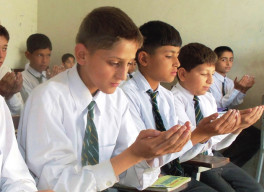
Reproductive health rights education is considered mandatory in developed countries, but the subject still remains uncovered in Pakistan. The need to include it in the curricula of all private and public schools to empower the youth was expressed at two events held in the capital on Friday.
At a media briefing by the HAYAT campaign that is advocating reproductive health rights education in schools, the chief executive officer of the campaign and Lifeline, a non-governmental organisation, said they intentionally included religious scholars from almost all sects to push forward their campaign and perhaps create awareness for the dire need for reproductive health education.
According to a baseline survey conducted by Lifeline, 62% girls and 67% boys in Islamabad have heard about reproductive health rights, as compared to only 39% girls and 50% boys in Lahore and 53% girls and 48% boys in Karachi, while awareness about contraceptive practices, sexually transmitted infections, emotional aspects of growing up and gender-based violence is low.
Meanwhile, at a learning forum organised to mark the completion of a three-year educational project, “Aagahee say Aagay,” speakers said Life Skills Based Education helps build confidence among youth by improving their psycho-social and interpersonal skills. The project aimed to empower young girls by educating them on developing life skills and leadership qualities to deal with sexual and reproductive health issues.
Ayesha Ali, programme manager of sexual and reproductive health and rights (SRHR) at Rutgers WPF Pakistan, said the project was implemented in 55 schools in Gujranwala and Sanghar districts. Some 19,000 adolescent girls were educated about life skills, leadership qualities and livelihood skills, promoting human rights and gender equality through innovative and interactive teaching methods. The girls were taught with the help of a workbook, “Khawab se Tabeer tak” (from dreams to reality) and an empowerment toolkit in the form of a board game.
Dr Talib Lashari from the Planning Commission said related departments such as women development, health and population were working in isolation. Ignorance of SRHR among the youth was affecting the economy as they get married and reproduce at a young age. Mothers face various health issues due to lack of family planning practices and are unable to contribute, he added.
National Commission on the Status of Women Chairperson Khawar Mumtaz stated that there was a huge information gap between people familiar with ground realities and people who represent the country at international forums.
The event was organised by Rutgers WPF Pakistan at a local hotel.
Published in The Express Tribune, March 30th, 2013.










































COMMENTS
Comments are moderated and generally will be posted if they are on-topic and not abusive.
For more information, please see our Comments FAQ